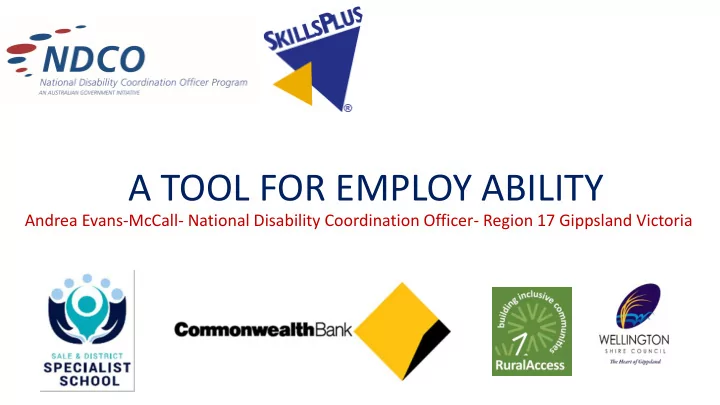

A TOOL FOR EMPLOY ABILITY Andrea Evans-McCall- National Disability Coordination Officer- Region 17 Gippsland Victoria
The NDCO program works toward the Australia-wide coordination and delivery of transition services for people with a disability on their career journey. The NDCO program’s goals are to: • Improve transitions • Increase participation • Establish better links
What is a CAREER?
A career includes all the roles you undertake throughout your life - education, training, paid and unpaid work, family, volunteer work, leisure activities and more. Department of Education and Training
‘Career' was traditionally associated with paid employment and referred to a single occupation. In today's world the term career is seen as a continuous process of learning and development. Activities that contribute to a career can include: training/education paid employment volunteer work work experience enterprise activities community activities leisure activities different life roles
Best practise in career planning involves an integrated personal centred approach, where career development is woven into all aspects of a persons life.
Research shows that young people transitioning from school benefit from having support networks both formal (agency based) and informal networks (friends, family, community members).
Support services for young people with disability their families and carers in rural or remote Australia are often inadequate.
In 2013 as the NDCO I set up the Wellington Disability Transition Network . Examples of network activities: • what next forums • parent engagement activates • inspiring young people with disability events • employability film/tool
The network is most effective because positive relationships have developed over time between schools, agencies and service providers that possess the capabilities and resources needed to support and foster positive outcomes for students with disability in post school transition.
Disability Employment Disability Service Providers Service Providers (DES) Wellington City Council National Disability Rural Access Coordination Officer Program Wellington Disability Other Service Providers Transition Network Apprenticeship Centres Gippsland East Group Training Local Learning & Organisations Employment Registered Training Organisations Network LLEN Industry Education TAFE / University Mainstream/Catholic/Independent Special Schools Community VCAL
The DES program across Australia currently assists around 3,600 secondary school students known as Eligible School Leavers (ESL). ESL: participants to access this service students must be in their last year of school and have the capacity to be employed for eight hours a week in open employment.
The evidence that collaborative networks like the Wellington Disability Transition Network are need is overwhelming. Let me share some research with you:
“Increasing employment prospects for young people living with a disability is key to improving financial security, personal wellbeing, social inclusion and mental and physical health issues.” ibid.
“Delayed or unsuccessful transitions to employment can lead to economic, social and personal disadvantage for young people, while also significantly increasing the risk of long-term unemployment and employment insecurity.” 0 J Skattebol, T Hill, A Griffiths & M Wong, loc. Cit.
“The post school transition to further study or employment is a crucial point in time for young people. While this transition period gives young people the opportunity to consolidate employability skills, develop a sense of job-readiness and make decisions about their lives and career paths.” Career guidance: the missing link in school to work transitions Bowen, Gabrielle; Kidd, Eliza
“The biggest predictors of post -school open employment are: 1.work experience in high school 2.parent expectations of post school employment” Predictors of successful transition from school to employment for youth with disabilities. Wehman P(1), Sima AP, Ketchum J, West MD, Chan F, Luecking R
EMPOLY ABILITY film/tool which was created by a sub group of the Wellington Disability Transition Network. Our end product demonstrates that linking individualised career development to authentic community based work programs will enable young people transitioning from school to demonstrate the employability skill required to be successful in employment.
https://www.youtube.com/watch?v=vGjNI16pxn8&feature=youtu.be
Supporting the film/tool is the Employ Ability Curriculum, the curriculum resource has been designed to work in conjunction with the film EMPLOYABILITY.
Again the evidence that this film/tool was needed is overwhelming. Let me share some research with you:
“The labour market demands employees who are ‘job ready’ who have contextualised their learning in workplace environments: an individual who has only ever applied their skills in a classroom setting will need to learn about the protocols and expectations of a work situation, and gain practical experience in applying their skills in a work environment before they can demonstrate their skills.” Commonwealth of Australia 2013: 6.
“Work experience supports students to understand the relevance and importance of the work they are doing at school, as well as increasing confidence in identity and abilities. Effective community based work experience programs have the potential to improve engagement and increase completion rates by 10 to 20%.” P Tatham, op cit., p. 1.
We hope that this film/tool will increase awareness of the contribution young people with disabilities can make to the workforce and their communities. We hope it will be used in schools, employment agencies and prospective employers, highlighting the skills that young people with disabilities can bring to the workforce, increasing inclusive employment opportunities
QUESTIONS
Recommend
More recommend